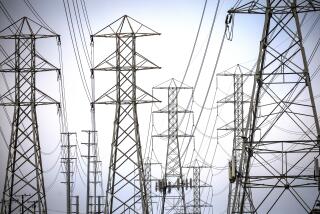Consider an Audit of Your Home Utility Bills
- Share via
When you get your utility bills each month, have you ever thought that the utility company might have made a mistake? If the answer is “no,” you’re not alone. Some people scour their bank statements for errors but never think to scrutinize utility bills.
But that mind-set could be costly, said Larry R. Etherington, president of Utilities Auditing Services in Phoenix.
Some studies have shown that as many as four out of five businesses are overcharged on utility bills, Etherington said. And sometimes the errors amount to tens of thousands of dollars. Similar--although smaller and less frequent--errors also crop up in individual utility bills, he said.
It is not uncommon to find errors in consumer utility bills that add up to several hundred dollars over a period of months, he added.
What kinds of errors might you find? The utility company could have billed you for the neighbor’s water usage. Or it might have failed to switch you over to less expensive winter electric rates at the proper time. Perhaps you didn’t get a discount that you’re entitled to. Sometimes consumers get stuck with a rate that’s simply not the best one available for their type of utility usage, Etherington said.
Even though utility bills can seem intimidating, auditing one doesn’t have to be a daunting task. It can be as easy as making a few phone calls and checking a few figures. Those with large bills and time on their hands might benefit from a more extensive audit. But, for the most part, individuals can complete a simple audit in about five minutes per bill once they’ve gathered the appropriate information.
To start, get a copy of the rate schedules or “tariffs” for each of your utilities, including gas, electric, water and sewer. You can get these rate schedules from the utility or from your local public utilities commission or department of corporations.
The tariffs detail the different rates charged by each utility and indicate when (or if) those rates will change with the season or amount of usage. Frequently, utility customers will get charged one rate for a minimum amount of usage and a second rate for usage over the minimum amount.
The second step is to familiarize yourself with your electric, gas and water meters. Find out where they are and how to read them. Also write down your meter numbers.
The most difficult to read is likely to be your electric meter, which is made up of several dials that register electric use in units of 10. Dial A usually registers kilowatt hours in units from 1 to 10. Once it makes a complete revolution, Dial B, which registers units from 10 to 100, will move forward one tick. When Dial B makes a full circle, Dial C, which registers units from 100 to 1,000, kicks up one, and so on. Some electric meters also have a separate demand dial, which shows your highest use during given peak periods.
Electric companies usually bill you by subtracting last month’s reading from this month’s reading. The difference is the number of kilowatt hours used during the month, which is multiplied by the appropriate rate. Your bill is that sum, plus taxes and monthly service charges. (There are some exceptions. For instance, people who are on the “demand rate” will be billed based on the highest use of electricity during certain peak demand hours.)
Electric meters are read from right to left. Gas and water meters are a touch simpler. They have fewer dials and are read from left to right, like a book. Still, the same principles apply. You take this month’s reading, subtract last month’s reading, multiply by the appropriate rate, add taxes and monthly service fees, and you should come up with the amount billed.
From here, a basic audit is a breeze. First check to see that the meter number listed on your statement corresponds with the number on your meter. Then check to be sure that the rates charged correspond with the rate schedule you got from utility regulators. (A common error is to fail to switch customers from summer rates to cheaper winter rates.) And finally, check the utility company’s math.
If you discover an error, call the utility company immediately. It should be able to revise the bill and give you credit for overcharges.
If the errors go back several months--or even years--you may have to check the statute of limitations in your state. In many cases, you lose out if you wait too long to claim a refund.
More to Read
Inside the business of entertainment
The Wide Shot brings you news, analysis and insights on everything from streaming wars to production — and what it all means for the future.
You may occasionally receive promotional content from the Los Angeles Times.










